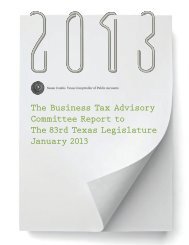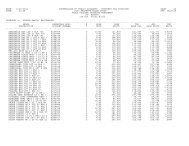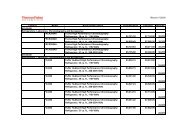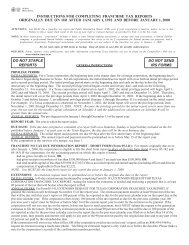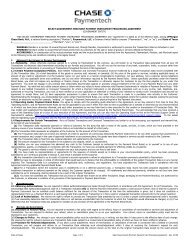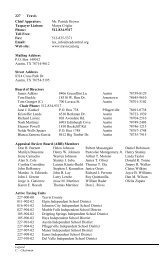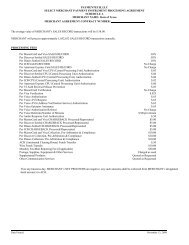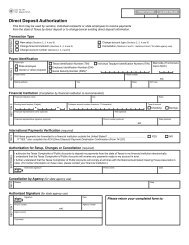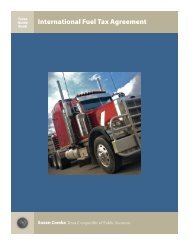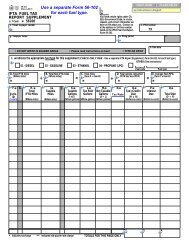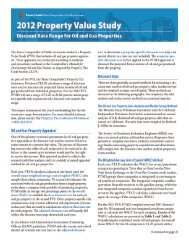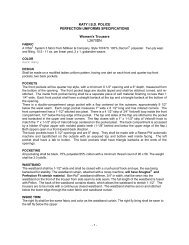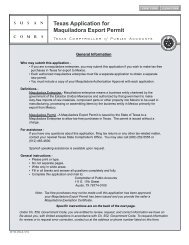Motor Vehicle Tax Guidebook 2011 - Texas Comptroller of Public ...
Motor Vehicle Tax Guidebook 2011 - Texas Comptroller of Public ...
Motor Vehicle Tax Guidebook 2011 - Texas Comptroller of Public ...
You also want an ePaper? Increase the reach of your titles
YUMPU automatically turns print PDFs into web optimized ePapers that Google loves.
winning ticket. Nor does the contest sponsor owe<br />
motor vehicle tax on the total price <strong>of</strong> the sold tickets.<br />
Seller-to-Contest Sponsor-to-Winner<br />
Transfer<br />
When a contest sponsor buys a motor vehicle and<br />
the seller assigns the title to the sponsor who in turn<br />
transfers the motor vehicle to the contest winner, two<br />
taxable events have occurred. The contest sponsor owes<br />
motor vehicle tax on the amount paid to the seller<br />
and the contest winner owes motor vehicle tax on the<br />
transfer <strong>of</strong> the motor vehicle from the contest sponsor<br />
to the contest winner. If the contest sponsor is not a<br />
licensed dealer, SPV procedures apply.<br />
Exceptions: The $10 gift tax applies when the contest<br />
sponsor, contest winner or both are a nonpr<strong>of</strong>it service<br />
organization qualifying under Section 501(c)(3), IRC.<br />
Remember, that although the $10 gift tax applies<br />
on the transfer, the motor vehicle tax is due when a<br />
Section 501(c)(3), IRC nonpr<strong>of</strong>it service organization<br />
purchases a vehicle to be used in a contest.<br />
Seller-to-Winner Transfer<br />
Although it may appear only one taxable transaction<br />
has occurred, two taxable transactions have occurred<br />
when a contest sponsor buys a motor vehicle and the<br />
seller assigns the title directly to the contest winner,<br />
bypassing the contest sponsor. Even though the title<br />
was not first transferred to the contest sponsor, this<br />
purchase transaction is still taxable as well as the<br />
recorded transfer <strong>of</strong> the motor vehicle to the contest<br />
winner.<br />
The rules for determining tax responsibility are the<br />
same in this situation as those in the previous section,<br />
“Seller-to-Contest Sponsor-to-Winner Transfer.”<br />
Dealer Contest Sponsor-to-Winner<br />
Transfer<br />
When a licensed dealer is a contest sponsor and<br />
transfers a motor vehicle directly to a contest winner,<br />
the winner owes motor vehicle tax based on the dealer’s<br />
book value <strong>of</strong> the motor vehicle. The dealer owes no<br />
motor vehicle tax on their acquisition <strong>of</strong> the vehicle.<br />
<strong>Motor</strong> <strong>Vehicle</strong> Won in Another State<br />
A <strong>Texas</strong> resident who wins a motor vehicle in another<br />
state and brings that motor vehicle into <strong>Texas</strong> will owe<br />
motor vehicle use tax based on SPV. If the contest<br />
sponsor is a licensed dealer outside <strong>of</strong> <strong>Texas</strong>, tax is<br />
assessed on the dealer’s book value.<br />
Co-Owners and Co-Signers<br />
• Transfer to Co-Owner or Co-Maker<br />
• Transfer to Co-Signer<br />
Transfer to Co-Owner or Co-Maker<br />
Transferring a title from one co-owner or co-maker<br />
to another is not a taxable transfer. Co-owners or<br />
co-makers have purchased a motor vehicle together.<br />
Both parties own the motor vehicle and, if there is a<br />
lien involved, both are jointly and severally liable for<br />
repayment <strong>of</strong> the entire loan. Taking over the sole<br />
responsibility <strong>of</strong> a lien does not make the transfer<br />
taxable. Each owner has been jointly and severally<br />
liable for the loan.<br />
Documentation should indicate that a co-owner or<br />
co-maker’s name is being removed from the loan.<br />
If a new co-owner gives any consideration to the other<br />
co-owner, then motor vehicle tax is due. SPV applies to<br />
the private-party purchase.<br />
Transfer to Co-Signer<br />
<strong>Tax</strong> is due when a co-signer takes possession <strong>of</strong> the<br />
motor vehicle. A co-signer who has agreed to guarantee<br />
the repayment <strong>of</strong> a loan on a motor vehicle does not<br />
become liable unless the borrower defaults. With the<br />
default, the co-signer could take direct ownership rights<br />
in the motor vehicle and owes motor vehicle tax on the<br />
assumed liability.<br />
SPV applies when the co-signer takes possession <strong>of</strong><br />
the motor vehicle, since the sale is a private-party<br />
transaction with no licensed dealer involved in the sale.<br />
III-8<br />
<strong>Motor</strong> <strong>Vehicle</strong> <strong>Tax</strong> <strong>Guidebook</strong>



